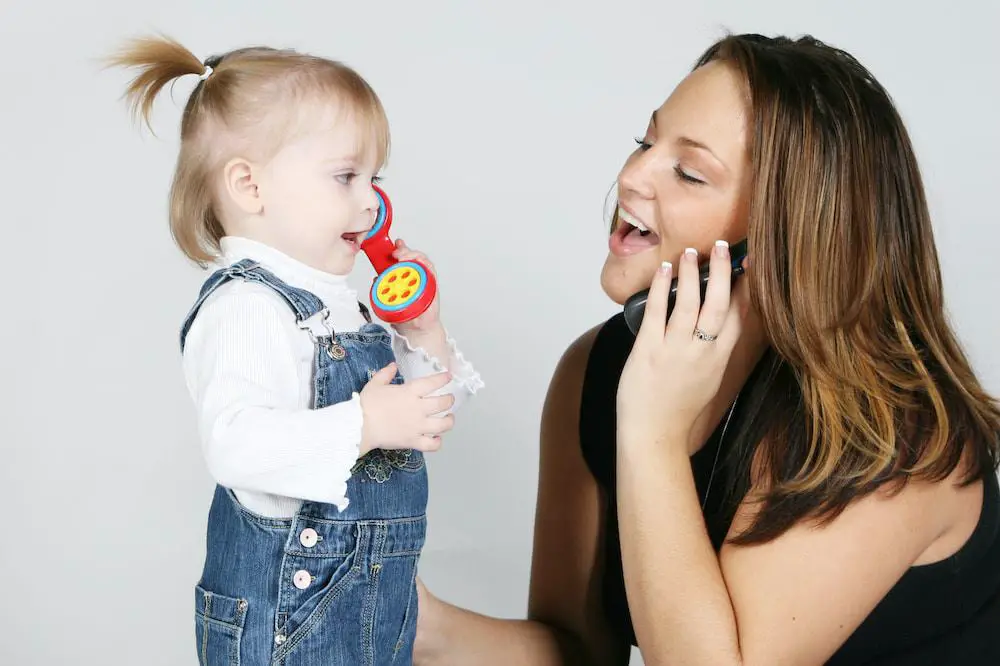Many parents worry that their young children might develop a speech delay, be unable to speak at all, or be hearing impaired.
It’s easy to fret over these things when you see other parents and their toddlers talking while yours does not.
The question that most parents in this situation worry about is Does speech delay run in families?
To put an end to this dilemma, we will discuss the most common contributing factors to speech delay, as well as other conditions related to late-talking.
Is It Really Speech Delay?
Though every child will develop differently, most children begin talking around the age of two.
If your child hasn’t already started talking by their second birthday, it might be time to consider speech delay as the culprit.
The best thing you can do is not stress out or compare your child to another.
Even when speech delay occurs, it isn’t a cause for concern right away because child development is different for each toddler.
Just make sure that you’re focusing on allowing your child to try to talk and talking to him or her as often as possible.
Some parents find that certain games can help with speech delay concerns; in fact, you can find many toys and games on the market that can help.
Other Possible Problems
There are other reasons why your child isn’t speaking as expected. Some of the common causes are:
1. Slow Catch-Up
While an underlying issue could cause speech delay, it might just be that your child is a late talker. They are going to catch up at some point.
Of course, you can’t assume that’s the case or believe the worst right away. If your child only knows a few words, they might just be playing the catch-up game.
2. Speech Disorders
Sometimes, your child might have a speech disorder called childhood apraxia of speech.
This is just one way to show how physical disorders can cause children to appear to have a speech delay.
Such disorders can make it hard for your child to talk, even if they know what the words mean and what to say.
It’s just difficult for them to produce the sounds correctly.
Generally, your child will need to see a speech and language pathologist for therapy. It will help your son or daughter learn to speak more effectively and quickly.
3. Hearing Loss
Children learn to speak by listening to others talk. Thus, speech delay might be a sign that there is partial or full hearing loss.
In a sense, your child doesn’t have a speaking problem; they’ve got a hearing issue.
When kids can’t hear the words properly, they find it hard to speak the words.
Often, your pediatrician can check for hearing problems. However, you may need to see a specialist to find out what is wrong with the ears and how the issue can be corrected.
4. No Stimulation
Sometimes, when children rarely hear people speaking or having a conversation, it’s hard for them to learn to talk.
Being immersed in a foreign culture is a better way to learn the language, and this applies to children in your home.
You’re stimulated fully with the conversation, so you always hear that second language.
When your children are learning to talk, they must hear you speak all the time.
Consider reading some books to your children at bedtime or throughout the day to help with this.
5. Muscle Disorders
In some cases, a neurological disorder could cause a muscle disorder that, in turn, affects your child’s ability to talk.
Some disorders, including cerebral palsy and muscular dystrophy, can affect the speaking muscles, making it appear that your child can’t talk efficiently.
If you feel that this is the cause, it’s essential to see a specialist early.
That way, a diagnosis can be made to control and manage the disorder.
Plus, this will help your child find other ways to learn to talk.
6. Physical Problems with the Mouth and Tongue
The term tongue-tied often refers to someone who stutters or can’t seem to get the words out.
Though it’s not a technical term, it can be a real issue.
A person’s tongue might be more connected to the bottom of the mouth than it should be.
This makes it hard to pronounce certain sounds or letters.
In turn, your child will struggle with talking and might appear to have a speech delay.
Instead, though, they are struggling to talk because the tongue is in the wrong spot.
Specialists can help fix your child’s tongue so that it sits correctly in the mouth and allows the right sounds to come through.

What Are the Possible Causes of Speech Delay?
Does speech delay run in families? Family and medical history can play a part in speech delay, but you’ve also got to consider how quickly your child is developing.
So, to get a clear answer, let’s discuss each one of these common causes.
Stages of Development
As mentioned, if they’re just a late-talker, it’s not necessarily anything to do with family genes.
Often, children work on their motor skills first and practice them most extensively.
Speech development then comes afterward. Many people refer to such children as motor kids.
Some children start saying their first words at a very early age but might be delayed in learning to walk or crawl.
Those children are sometimes called early talkers.
The point is that parents need to realize that their kids can develop any or all of their skills at different times.
What is considered normal for one child might not be for another.
It can’t be stressed enough that you’ve got to focus on your particular child.
Even if you are worried about their development, you mustn’t let them see you upset.
They take their cue from you, so if you’re nervous or appear angry, it will confuse them.
Continue working with them on their motor skills by reading, using speech therapy games, and being supportive.
Medical History
Your child’s medical history might contribute to a speech delay.
If you go to a specialist, such as a speech-language pathologist, they will ask you specific questions.
During the process, you will fill out some forms and talk to the doctor. Part of this includes developmental and birth history.
Sometimes, the issue arises during the birthing process. Things that happened during pregnancy can also play a role.
Though birth defects may be the culprit, your child’s current medical conditions can be factored in.
For example, if your child has recurrent middle ear infections (otitis media), it can impact their ability to speak.
With a recurring ear infection, children miss some of those critical components that make speech possible.
For instance, your words and sounds you make while talking get distorted because of the blockage within the ear.
If your child has multiple ear infections, they will miss language concepts, words, and directions that are critical now.
Though there isn’t much you can do here, it’s important to keep at it.
Often, your pediatrician can give your child medication to clear up ear infections. Sometimes, surgical intervention is needed.
Likewise, you may need to work with an audiologist to get hearing tests and other help.
Family History
Family history might play a role in the development of speech. Many families have the same articulation problems, such as stuttering or slurring words.
If you have a speech impediment, your child is likely going to do the same.
When you have a second or third child, all siblings might present with those same issues. They’re all learning from you and each other.
Yes, speech delay can run in the family, so if you’re worried about your child’s speech development, consider taking a look at your family’s history.
Find out about your mom’s and dad’s issues and that of your child’s father.
You may also want to consider both sets of grandparents and great-grandparents.
Early detection is the best way to prevent issues for your children later in life.
Does Speech Delay Run in Families?
Often, parents worry when their toddlers can’t talk by 18 months old.
Though you want to hear their first words and teach them how to say “mama” and “dada“, issues might arise.
Sometimes, they just develop a little later than other children, but there could be a more serious cause for it.
Yes, speech delay can run in families, so you must look to the past to determine what might be causing the issue.
You can also work with them by reading books and choosing toys that talk or help your child learn to speak.
Sometimes, though, professional intervention is needed, such as a speech pathologist, pediatrician, and audiologist.

